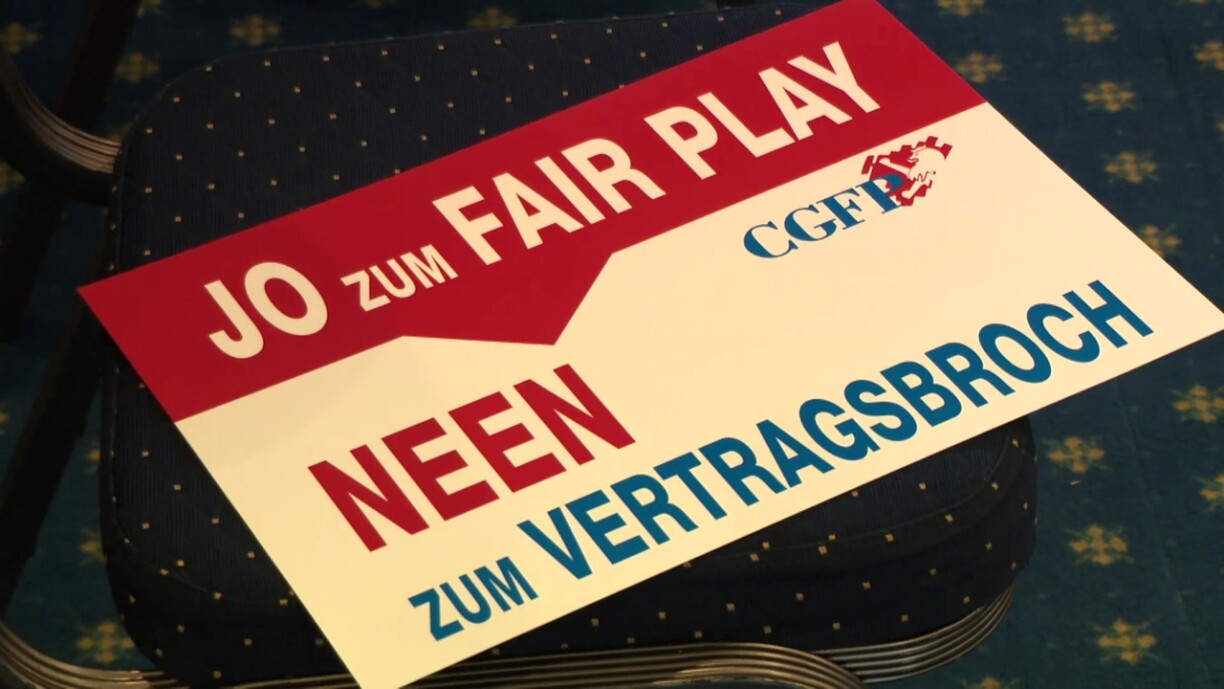
In April, the Civil Service Union CGFP criticized the government during a protest for playing with social peace. In October, Minister of Labour Georges Mischo made himself unpopular with trade unions OGBL and LCGB due to his ideas for collective agreements.
At a large rally at the Parkhotel in Dudelange, the Civil Service Union demanded that the government adhere to the salary agreement. The background was the evaluation system in the military. CGFP General Secretary Steve Heiliger stated:
“Didn’t the Prime Minister, who calls himself the CEO of the government, once say that the captain must also occasionally pound his fist on the table when his ministers don’t want to speed up? Well, that moment has long since passed, colleagues.”
Shortly before negotiating the new salary agreement, the union had become more positive towards Minister for the Civil Service Serge Wilmes, as CGFP President Romain Wolff hinted on December 6: “I must say that we currently have a good relationship with him.”
On the other hand, the conflict between the trade unions and the Minister of Labour is far from over. In October, the trade unions walked out of the Committee on Labour and Employment. Georges Mischo raised the question of whether only unions could negotiate collective agreements. OGBL and LCGB decided after the meeting to work together on an action plan. Before their first meeting, the government gave the green light to extend Sunday working hours in commerce from 4 to 8 hours.
LCGB President Patrick Dury asserted: “If Sunday work is regulated by a collective agreement, there is no issue anymore.”
For the unions, it is a significant issue – if longer working hours no longer need to be negotiated in the collective agreement, their bargaining power will naturally diminish. Regarding the exclusivity of negotiating collective agreements, Prime Minister Luc Frieden made it clear at a press conference at the end of October that this was not in question. He also added:
“At the same time, one must of course look at what exactly is the content of these collective agreements? Should certain details be more tailored to businesses? How do we modernize the organization of working hours?”
The statement did not calm the unions. On December 3, OGBL and LCGB called for a demonstration at the Parkhotel in Dudelange. Nora Back and Patrick Dury were very clear in their words.
“The government talks a lot about respect and also about social dialogue. But unfortunately, it doesn’t practice it”, Nora Back stated. Dury emphasized their intent: “OGBL and LCGB agree that if our demands are not implemented, we will go to the extreme with strike actions, and a general strike, if necessary.”
In an initial reaction, CSV Minister of Labour Georges Mischo expressed confidence, although he regretted that personalities were in the foreground, instead of actual actions.
However, in the last government council before the Christmas holidays, a decision was made that angered the trade unions – the opening hours in commerce and crafts should be extended.
DP Minister of Economy Lex Delles said that 80% of businesses already had exemptions:
“I think that in the end, this text won’t change much on the ground, because we already have a situation today where all these exemptions are functioning.”
However, David Angel from OGBL disagreed with this argument, stating that “for example, there were no exemptions until 10 p.m. during the week” which would make this a drastic intensification of the phenomenon of flexibilization of working hours.
The relationship between the government and the unions remains rather tense, and there’s still a long way to go before reaching the goal of improved social dialogue in 2025.